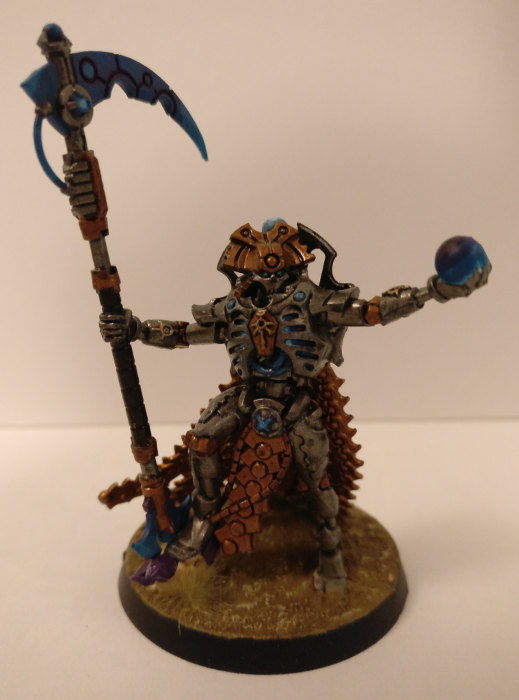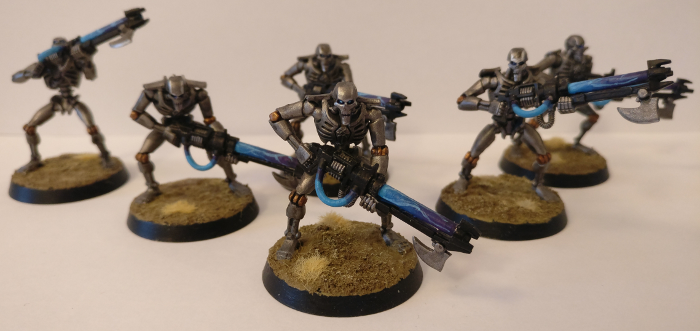In the grim darkness of the present time there is only war
I've come rather late to Warhammer 40,000. A good friend of mine, our youth worker at church, has been playing it for years, and after hinting for a while that I should really start playing, he convinced me that the impending release of the 8th edition was an excellent time to give it a go. I decided that Space Marines didn't look very interesting, and so I now have a very small army of Necrons — here's my lone Overlord:

"Alas, poor Resurrection Orb. I knew him, Horatiakh"
(Image: Chris Knowles)
Getting into 40k has produced a few changes in my life:
- My dining table has been covered in plastic sprues since 8th Edition came out.
- I now own more different colours of paint to create my army of tiny soldiers than I do to decorate my flat.
- Now that I've seen it, the word "Ecclesiarchy" seems like such a natural one to describe a religious structure that I'm perilously close to accidentally using it in conversation about the church.
I've always been keen on lore in any setting, so I've been reading the fluff in the core rulebook and in various places online. Having been steeped in all this, it struck me a couple of weeks ago that the 40k tagline, "In the grim darkness of the far future there is only war", is a pretty good analogy for the current reality we face as a species as we fight against sin.
On one level, the Bible's clear that as a species we're addicted to sin. It makes bold promises — in its simplest form, it's the promise the snake made to Eve in the Garden of Eden: rebel against God and you'll be like him, deciding what's right and wrong, and being in charge. It's alluring, and we're hopelessly under its sway, as David notes in Psalm 14:
The Lord looks down from heaven on all mankind
to see if there are any who understand, any who seek God.
All have turned away, all have become corrupt;
there is no one who does good, not even one.
— Psalm 14:2-3
But whilst sin has its grip on us, we're not keen on the resulting mess that we make of the world, and so we're also engaged in a running battle to limit the effects of sin. Governments exist to provide a structure to society. Police and criminal justice systems exist to restrain sin and limit its effects. Charities work to protect the most vulnerable from the damaging effects of the way our society is built. But the problem is that this is fighting the symptoms, not the cause, namely our rejection of God.
In 40k, whatever victories may be won, whatever heroic stories we may tell as we roll the dice, whatever invasions may be repelled or whatever alien menace may be defeated, these are tiny, temporary victories in a galaxy that's always on the brink of collapse. And the world we live in now is like that. Just like the Imperium of Man in 40k can never really defeat the forces of Chaos and the Xenos (after all, if they could, Games Workshop wouldn't be able to sell the relevant tiny fighting people/Orks/Eldar/Necrons/Tau, etc. any more), we can't defeat sin on our own. We do win victories against it, every time a terror plot is foiled or a criminal gang is put behind bars or a company is prosecuted for cutting corners and putting people at risk to increase profits. But these victories are tiny and temporary. Our addiction to sin means that there are always more terrorists, more gangs, more executives placing profits before people. If sin won't submit to God, it certainly won't submit to any human attempt to deal with it.

Shoot these guys as much as you like, they'll get back up and keep advancing. Sin is the same.
(Image: Chris Knowles)
What, then? Are we doomed to 40,000 years of futility? Humanity in Warhammer 40k doesn't have much hope. They might trust in the Emperor, but he's almost dead and hasn't left his cybernetic throne in millennia. The Ecclesi Christians, however, have a much better hope that we can hold out to the world. Our King, Jesus, did die, and then he rose from the dead. No "messianic" 40k Emperor can outdo the real Messiah. And Jesus' death and resurrection carries with it the promise of the defeat of sin. In the immediate sense, Christians are still sinners, but we're set free from slavery to sin, as Paul reminds the Roman church:
But thanks be to God that, though you used to be slaves to sin, you have come to obey from your heart the pattern of teaching that has now claimed your allegiance. You have been set free from sin and have become slaves to righteousness.
— Romans 6:17-18
God is at work in his people, making them more and more like him as time goes by (the theological term for this is "sanctification"). This process won't be complete this side of heaven, but that leads me right into the second way Jesus' death and resurrection defeats sin. It puts those who trust in him right with God, so that we can be part of the new Creation that will arrive when Jesus returns. That might happen in 40,000 years, or a million years, or tomorrow, we don't know. But one day sin will be obliterated. The Emperor of Man tried to unite the whole galaxy in a human empire, but he couldn't finish the job and now the Imperium totters on the brink of collapse. When Jesus returns, the whole universe will be built afresh, and his Kingdom will last forever.
Jesus offers something far better than perpetual desperate rearguard actions and a hurried retreat for every small step forward. Jesus' promise is this: in the bright light of the far future, there is only peace.